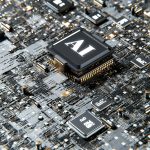
In recent years, the convergence of artificial intelligence (AI) and blockchain technology has been reshaping the landscape of the crypto world. From enhancing security to improving trading strategies, the fusion of these cutting-edge technologies holds immense potential for revolutionizing the way we interact with cryptocurrencies. This article explores the various ways AI is making its mark in the crypto sphere and delves into the question of whether blockchain technology is truly beneficial for the advancement of the digital economy.
Enhanced Security: One of the most significant contributions of AI to the crypto world is in bolstering security measures. With the proliferation of digital assets and the constant threat of cyber attacks, ensuring the safety of transactions and investments has become paramount. AI-powered algorithms can analyze vast amounts of data in real-time to detect suspicious activities, identify potential threats, and prevent fraudulent transactions. By leveraging machine learning techniques, cryptocurrency platforms can fortify their defenses against hacking attempts and unauthorized access, instilling greater trust and confidence among users.
Predictive Analytics: AI algorithms have also proven to be invaluable in the realm of predictive analytics for cryptocurrency markets. By analyzing historical data, market trends, and social media sentiments, AI systems can generate actionable insights to inform investment decisions. These predictive models can forecast price movements, identify trading patterns, and optimize trading strategies with a level of accuracy and speed that surpasses human capabilities. As a result, investors can make more informed decisions, minimize risks, and capitalize on lucrative opportunities in the volatile crypto market.

Automated Trading: In addition to predictive analytics, AI-powered trading bots are increasingly being utilized to automate trading processes in the crypto world. These bots execute trades based on predefined criteria, such as price fluctuations, volume changes, and technical indicators, without the need for human intervention. By continuously monitoring market conditions and executing trades with split-second precision, these bots can capitalize on market inefficiencies and exploit arbitrage opportunities, thereby maximizing profits for traders. However, it’s essential to exercise caution and implement robust risk management strategies to mitigate the inherent risks associated with algorithmic trading.
Decentralized Finance (DeFi): The intersection of AI and blockchain technology has also paved the way for innovative developments in decentralized finance (DeFi). Smart contracts, powered by blockchain technology, enable the automation of financial transactions without the need for intermediaries. AI algorithms can further enhance the capabilities of these smart contracts by providing advanced functionalities, such as risk assessment, credit scoring, and automated lending protocols. This fusion of AI and blockchain in DeFi not only streamlines financial processes but also fosters financial inclusion by providing access to banking services for underserved populations.
Challenges and Considerations: While the integration of AI and blockchain holds immense promise for the crypto world, it’s essential to acknowledge and address the challenges and ethical considerations that accompany these advancements. Concerns related to data privacy, algorithmic biases, and regulatory compliance must be carefully navigated to ensure the responsible and ethical deployment of AI in the crypto sphere. Additionally, as the technology continues to evolve, ongoing research and collaboration are crucial to harnessing its full potential while mitigating risks.
Is Blockchain Good for Technology?
The question of whether blockchain technology is beneficial for the advancement of technology is a complex one, with opinions varying widely depending on perspective and context. Proponents argue that blockchain offers unparalleled security, transparency, and decentralization, making it a transformative force across various industries, including finance, supply chain, healthcare, and beyond. By eliminating the need for intermediaries and enabling peer-to-peer transactions, blockchain has the potential to streamline processes, reduce costs, and foster trust in a trustless environment.
However, detractors point to challenges such as scalability, energy consumption, and regulatory uncertainty as barriers to widespread adoption. The inherent trade-offs between decentralization, scalability, and security pose significant challenges that must be addressed to realize the full potential of blockchain technology. Additionally, the proliferation of blockchain-based applications has raised concerns about environmental sustainability due to the energy-intensive nature of certain consensus mechanisms, such as proof-of-work.

In conclusion, the marriage of AI and blockchain is reshaping the crypto world in profound ways, from enhancing security and predictive analytics to revolutionizing decentralized finance. While blockchain technology holds immense promise for advancing technology and disrupting traditional systems, it also presents challenges that must be addressed through collaboration, innovation, and responsible governance. By harnessing the synergies between AI and blockchain, we can unlock new opportunities for innovation, empowerment, and inclusion in the digital economy.





